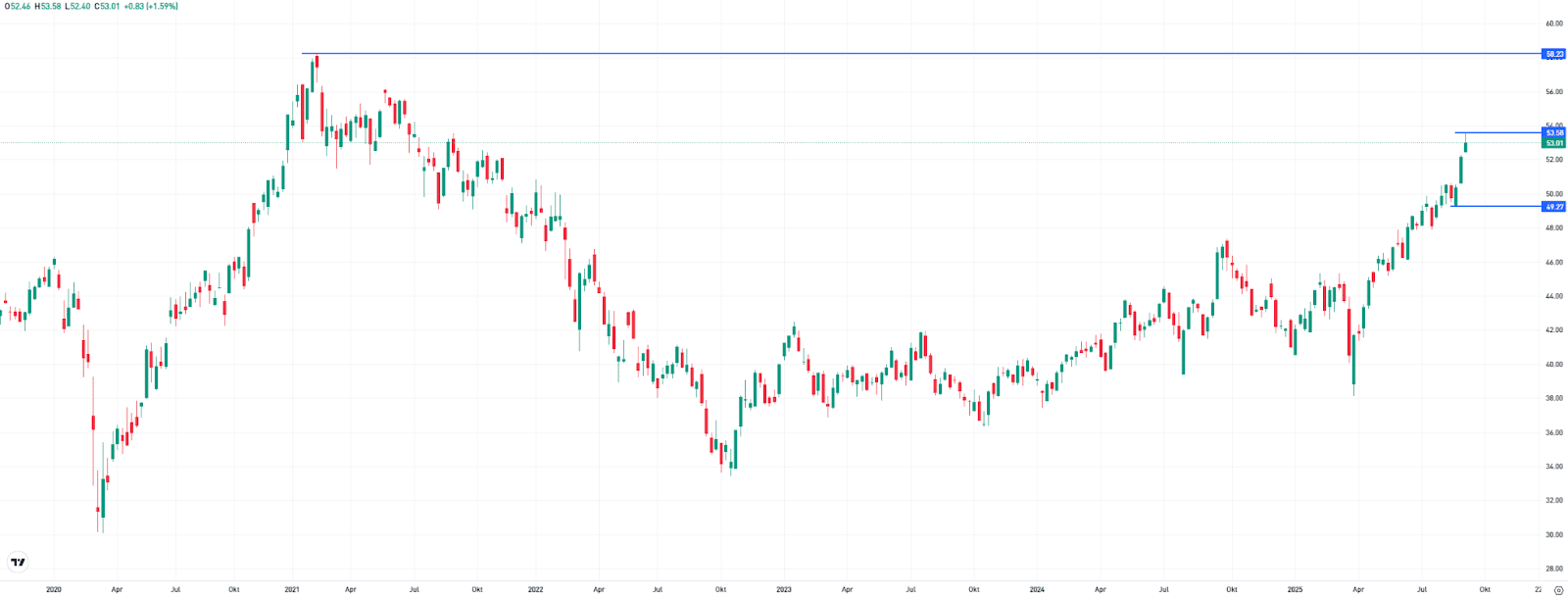Analyst Weekly, September 22, 2025
After almost 15 years within the shadows, small caps would possibly lastly be prepared for his or her close-up. As soon as the darlings of Wall Avenue, they’ve underperformed massive caps for over a decade. They’re not as low-cost as they had been within the early 2000s, however historical past means that when one dimension group outperforms for ten years (like massive caps simply did), the pendulum often swings again.
Why They’re Trying Higher Now
The Russell 2000 (small-cap shares) simply hit an all-time excessive after 4 years of ready.
1. Valuations and historical past are on their aspect. Small and mid caps are inclined to outperform when general market returns are low. That’s as a result of they act like “low beta” belongings over the lengthy haul. Because of time diversification, weak a long time are often adopted by stronger ones.
2. A uncommon and bullish sign from earnings revisions. For the primary time in years, greater than half of small-cap firms are seeing upward earnings revisions. This may not sound thrilling, however traditionally this measure has spent most of its time under 50% for the reason that late Nineteen Nineties. Sustained revisions above that threshold have often meant robust ahead efficiency.
3. Falling curiosity burdens. One of many greatest headwinds for small caps has been their reliance on short-term debt. However the tide is popping: curiosity expense as a share of whole debt has dropped to six.9%, the bottom in additional than a yr. With the market pricing in 5 further Fed cuts by the top of 2026, small-cap financing prices ought to hold easing. That’s a game-changer for firms that stay and die by their value of capital.
4. Coverage Tailwinds: OBBB Tax Wave. There’s additionally a fiscal kicker on the horizon. The fiscal tax refund from “One Large Lovely Invoice”, anticipated to be round $150 billion, will hit U.S. households in 2026, which may very well be a windfall for small caps. Right here’s why:
Shopper-sensitive publicity: In contrast to mega-caps with world operations, small caps rely closely on U.S. home demand. More money in shoppers’ pockets ought to stream straight into homebuilders, retailers, eating places, and discretionary sectors.
Financing aid: The invoice consists of tax incentives and accelerated write-offs that scale back curiosity bills. That issues extra for smaller corporations that don’t have the pristine stability sheets of Apple or Microsoft.
In different phrases, OBBB is a direct shot of adrenaline to the small-cap economic system.
5. Progress Outlook Turns a Nook. After years of enjoying catch-up, the 2026 development outlook for small caps has shifted decisively increased. For the primary time in over a decade, small caps are displaying a sustained path of earnings development that might outpace their large-cap friends.
Sector Vibrant Spots:
Sure corners of the small-cap world stand to learn essentially the most:
Homebuilders and banks – each extremely delicate to decrease charges and home demand.
Shopper discretionary – the primary cease for tax-refund-driven spending.
R&D-intensive SMID caps – corporations boosted by insurance policies like 100% R&D expensing.
These are the areas the place fiscal tailwinds and easing monetary situations overlap most straight.
Why Upside May Proceed:
Robust market breadth: The rally isn’t just some shares; many are taking part.
Brief squeeze gasoline: Hedge funds have been closely betting towards small caps. If costs hold climbing, these shorts could also be compelled to cowl, pushing shares even increased.
Restricted inflows: Traders haven’t poured cash into small-cap ETFs but. That leaves room for brand new shopping for so as to add gasoline to the rally.
Enhancing fundamentals: Earnings development for small caps is anticipated to rebound strongly in 2026, and their curiosity prices as a share of debt are coming down.
Investor Takeaways:
Close to-Time period Enhance: Between upward earnings revisions, declining curiosity prices, and the OBBB tax wave, small caps have significant cyclical upside heading into 2026.
Strategic View: Long run, business-funded R&D focus and AI dominance nonetheless tilt in favor of huge caps- scale does matter. That focus in mega-caps stays a long-term benefit for the giants. However low-cost valuations, imply reversion, and government-funded R&D help barely favor small caps over the subsequent decade.
Portfolio Tilt:
Tactical: Take into account positioning for small-cap upside as stimulus and falling charges kick in.
Strategic: Control Washington: if industrial coverage and R&D subsidies ramp up, small caps might take pleasure in not only a comeback, however a renaissance.
Fed Slicing Cycle & Banks
It’s uncommon for the Fed to chop charges when financial institution shares are sitting at file highs. In truth, it has solely occurred 3 times previously: 1992, 1995 and 1996. Sometimes, the sector is down 20% or extra earlier than the Fed steps in with simpler coverage. What’s notable is that in these uncommon situations, banks really continued to steer markets afterwards. Immediately, situations look comparable: credit score markets stay calm, high-yield spreads are tight, and the rally is broad-based throughout sectors.
For retail buyers, the important thing takeaway is {that a} price reduce on this surroundings isn’t an indication of stress, however relatively an effort to increase the cycle. That might imply financials and different cyclical areas of the market nonetheless have room to run, whilst coverage shifts. Diversification stays vital, however historical past suggests energy in banks could be a optimistic sign for equities extra broadly.
Rising-Market Shares Outpace the S&P 500
The MSCI Rising Markets ETF (iShares) gained 1.6% final week, marking a 3rd straight week of positive factors. For the reason that April low, the rebound is 39%, greater than the STOXX Europe 600 (21%) and the S&P 500 (37%). Whereas each of these indices have hit file highs a number of occasions this yr, the EM ETF nonetheless has catching as much as do. The hole to its all-time excessive is 9%. The uptrend stays intact, so a check within the coming months is feasible.

iShares MSCI Rising Markets ETF, weekly chart. Supply: eToro
A Progress Enhance From The Fed?
The rally in EM equities displays expectations of higher situations. Markets look forward and are often a step forward of the actual economic system. Dependence on the greenback and U.S. rates of interest stays essential. Many firms borrow in {dollars}. If charges fall, funding turns into cheaper. If the greenback weakens, the identical greenback debt prices much less in native foreign money. After an extended pause, the Fed resumed reducing charges final week and signaled two additional strikes by year-end. The macro tailwind kicks in with a lag, the results will seemingly filter into the actual economic system progressively.
It’s additionally increased development. In 2024, India (6.5%), Malaysia (5.1%), China (5.0%), and Indonesia (5.0%) grew by 5 p.c or extra. Even the U.S. is way from that, Europe all of the extra so. Many buyers are subsequently wanting past their residence markets and utilizing the worldwide fairness universe to diversify extra broadly.
One-Cease Store: Rheinmetall Enters Shipbuilding
Rheinmetall is buying the naval division of Bremen-based Lürssen Group, with closing deliberate for early 2026. The value is estimated at round €2 billion. The unit, comprising 4 shipyards in northern Germany and several other worldwide websites, employs round 2,100 folks and generated about €1 billion in income in 2024. Administration is focusing on roughly €300 million in EBITDA by 2027, with the margin rising from 10% as we speak to fifteen% by 2030. In parallel, Rheinmetall goals for not less than €5 billion in naval-segment income. The main focus shall be on naval munitions, notably rocket motors and last meeting, areas the place world demand is elevated and lead occasions typically run to a number of years.
Rheinmetall trades at a ahead P/E of 52, a valuation that underscores buyers’ exceptionally excessive development expectations. The common throughout six main world protection firms—RTX, Safran, Honeywell, Lockheed Martin, Rheinmetall, and BAE Programs—is 28. In contrast, its LTM EBIT margin of 13.9% is above the peer common of 13.2%.
The inventory briefly hit a brand new file excessive of €1,979 final week. Nevertheless, the breakout above the June excessive didn’t stick. The RSI at 72 additionally factors to a barely overbought market. There are short-term warning indicators, however so long as the €1,320 low holds, the long-term uptrend stays intact. If the breakout above the June excessive succeeds, Fibonacci extensions at €2,110, €2,279, €2,367, and €2,494 might function the subsequent potential worth targets.

Rheinmetall inventory, weekly chart. Supply: eToro

This communication is for data and schooling functions solely and shouldn’t be taken as funding recommendation, a private suggestion, or a proposal of, or solicitation to purchase or promote, any monetary devices. This materials has been ready with out taking into consideration any specific recipient’s funding goals or monetary scenario and has not been ready in accordance with the authorized and regulatory necessities to advertise impartial analysis. Any references to previous or future efficiency of a monetary instrument, index or a packaged funding product should not, and shouldn’t be taken as, a dependable indicator of future outcomes. eToro makes no illustration and assumes no legal responsibility as to the accuracy or completeness of the content material of this publication.



![Crypto News Today [Live] Updates On March 2, 2026 Crypto News Today [Live] Updates On March 2, 2026](https://i0.wp.com/image.coinpedia.org/wp-content/uploads/2025/04/03180108/Crypto-News-Today-3rd-April-_-Pi-Coin-Price-ADA-Price-Bitcoin-News-Ripple-News-and-XRP-ETF.webp?w=350&resize=350,250&ssl=1)





